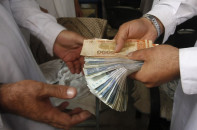Economic woes: Fresh IMF loan linked to tough conditions
The move puts cash-starved Pakistan in an awkward position.

The International Monetary Fund (IMF) is unlikely to sanction a second loan programme for cash-starved Pakistan without upfront implementation of the tough conditions that were not the hallmark of the $11.3 billion bailout package.
The move, which underscores the IMF’s growing mistrust in Pakistan, puts Islamabad in an awkward position amidst an ailing economy and looming political instability.
Background interviews with government officials reveal that the IMF has linked the followup loan programme with the prior implementation of unpopular decisions after it found Islamabad breaching confidence time and again.
The size of the second programme might be between $3 and $5 billion and prior implementation of a couple of conditions may result in rescheduling of the repayments of loans obtained under the standby arrangement.
According to the original schedule, repayment will start next year. The duration of the next programme may be up to four years with stringent quarterly reviews.
This time, the officials said, Pakistan would not qualify for standby arrangement. The government may apply for the poverty reduction and growth facility, which is aimed at policies that are clearly focused on economic growth and poverty reduction and consistently implemented.
On the contrary, the standby arrangement enabled Islamabad to get $3.1 billion first tranche in November 2009 without implementing tough actions. However, when the time came for taking difficult and politically unpopular decisions the government went back on its commitments, resulting in the suspension of the programme.
Pakistan is seeking another programme to pay back the debt it has obtained under the standby arrangement and to seek budgetary support from other lenders who have also sought an IMF certificate in the wake of the haphazard approach of the country’s economic managers.
The economic team, led by Finance Minister Abdul Hafeez Shaikh, held talks with the IMF on the fringes of spring meetings of the World Bank and the IMF. However, the talks could not make any headway after the IMF refused to show flexibility. There was also disagreement on the restoration of the suspended programme and a common way to bridge it with a new one.
Officials said that the next loan programme, if approved by the IMF, may likely to revolve around the conditions of restructuring of the public sector enterprises that includes shedding the workforce - a condition that may put the PPP-led coalition government in an awkward situation ahead of the general elections scheduled for 2013.
Under the condition of the financial improvement plan of PSEs, the IMF would like Islamabad to reform the Pakistan International Airlines, Pakistan Railways, Pakistan Steel Mills, Pakistan Electric Power Company, Trading Corporation of Pakistan and Pakistan Agriculture Storage and Supply Corporation.
A finance ministry official, who had worked with former prime minister Shaukat Aziz, said that the government had then prematurely concluded the PRGF as the vested groups opposed privatisation of power and oil sectors. This condition, he said, may again be added to the next programme.
Officials said the IMF would again press the government to go ahead with full implementation of the reformed general sales tax (RGST) regime before seeking the followup programme.
In a recent programme note, the IMF had indirectly criticised the performance of Dr Hafeez Shaikh, saying that the government carried out reforms in 2008-09 but reversed the gains in 2010-2011.
The US government is also pressing Islamabad to implement structural reforms. In a recent meeting between Pakistan and the US Treasury Department Washington said, “Major structural reforms, including the energy sector, remain necessary to help create the conditions for strong growth and employment creation”.
Officials said the IMF may ask Islamabad to give more autonomy to the State Bank of Pakistan - a condition that was also part of the suspended programme but not fully implemented. It may also put a condition on debt management and restrict Islamabad from short-term borrowing.
Published in The Express Tribune, April 20th, 2011.



















COMMENTS
Comments are moderated and generally will be posted if they are on-topic and not abusive.
For more information, please see our Comments FAQ